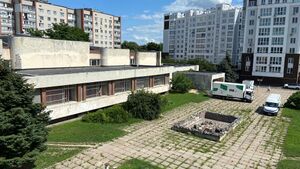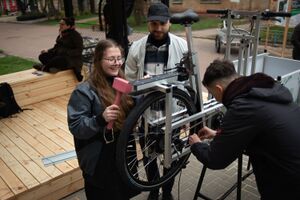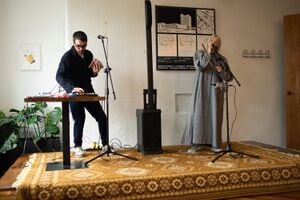Chernihiv on the Desna River has always been known for its rich history, cultural heritage, and architectural landmarks. Now it is also known for its citizens, whose remarkable courage and determination – to the point of blowing up their own bridges – halted the advance of Russian forces. The Tolocar project worked with the local community on several projects, e.g. to build a new innovation hub.
Tolocar Stories: Creativity, Culture, Compassion[edit | edit source]
Peremoha Lab[edit | edit source]
Local administrators, the Polytech, and civil society organizations came together to create a new Fab Lab in an old cinema – inspired by the Tolocar project.
Ostriv Platform, a dedicated partner of the Tolocar project since its inception, introduced us to the vibrant civil society of Chernihiv. In April 2023, our first interventions with two Tolocars - making wooden lace, e-cargo bikes, and musical instruments - ignited enthusiasm in the local IT Cluster, Polytech, and the entire community. They all had long envisioned transforming an old cinema into a dynamic Fab Lab and running a Business Incubator Program there: Peremoha Lab was established in 2023.

Renovation, Replication, Rave[edit | edit source]
After careful planning, a toloka united the complete fleet of mobile makerspaces and over 100 volunteers in July 2023, collaboratively building and equipping the lab with several replicated machines. Bearing the name "Victory” from the original cinema, Peremoha Lab stands as a testament to the power of making, fueled by the united spirit of a community driven to rebuild the city through creativity and innovation. Chernihiv's journey toward renewal and prosperity has just begun, inspired by the boundless potential of collaborative making.
Merezhyvo - Wooden Lace[edit | edit source]
Ornate wooden decorations on traditional Ukrainian buildings called merezhyvo have deep historical significance in Chernihiv. Tolocar's digital fabrication capabilities significantly expedited the process of creating these intricate decorations.
Reviving Tradition[edit | edit source]
The Chernihiv Region boasts abundant forests, giving rise to traditional wooden architecture unique to the area. The merezhyvo or "wooden lace" ornaments which adorn these distinctive single story houses are characterized by floral and geometric designs, animals, birds, and musical instruments. Despite the architectural and historical significance of these structures, they face threats due to a lack of awareness and preservation efforts. In response, a team of volunteers, led by the Wooden Lace of Chernihiv online museum, has been restoring and documenting these buildings.
Using Digital Technologies[edit | edit source]
The museum's mission is not just to preserve the artifacts, but also to revive the cultural practice of manufacturing wooden lace. In collaboration with the departments of Mechanical Engineering and Woodworking at Chernihiv Polytechnic National University, they have started to use CNC routing as a digital alternative to handcrafting the decorative pieces. The Tolocar project supported the restoration of one house during our initial visit in April 2023. Utilizing CNC equipment directly on site, a Tolocar team and local volunteers created ornamental pieces with precision and accuracy. They also scanned several buildings as a first step to creating digitized models of valuable buildings. A catalog of wooden lace designs will be made available online, ensuring that this treasured art form, which is making a resurgence in Chernihiv, will now be accessible and replicable worldwide.
Wheels of Progress[edit | edit source]

The Tolocar project brought together XYZ Cargo from Hamburg and Eco Misto from Chernihiv to promote sustainable transportation with bikes.
Fostering Urban Mobility[edit | edit source]
Eco Misto (meaning “EcoCity”) is a local champion of cycling-focused urban transformation in Chernihiv. Over the years, the organization has successfully carried out numerous initiatives, including the delivery, repair, and redistribution of EU-donated bicycles among local residents, police, and civil servants, along with the creation of dedicated cycling lanes on public roads. Beyond mere transportation, this initiative advocates for improved cycling infrastructure and urban planning in Chernihiv.
Eco Misto's centrally-located community bicycle repair workshop is a buzzing hub of activity right in the middle of the only pedestrian street in Chernihiv. Over the course of four days in April 2023, a joint team of members from Tolocar, XYZ Cargo, and Eco Misto, supported by a group of local volunteers, assembled three open-source electric cargo tricycles, drawing considerable attention from the locals.
“This trip was important, impressive and in a way also surreal to me: Meeting so many great and forward-thinking people while there is so much destruction to be seen.” Till Wolfer, XYZ Cargo
The XYZ Cargo bikes boast a striking DIY-friendly, and locally-reproducible design, reinforcing Eco Misto's advocacy for cycling-focused living. From personal health to community empowerment, these bikes embody the essence of sustainable urban mobility. With production centers in Copenhagen, Hamburg, Edinburgh, and now Chernihiv, their versatile designcan adapt to diverse local requirements, fostering community expertise with each build.
The profound impact of this endeavor resonates far beyond mobility, encouraging Chernihiv's community to embrace cycling as a way of life. One of the cargo bikes now serves as a mobile bike repair workshop, while the other two were thoughtfully adapted to cater to specific priorities set by the local community: repairing homes destroyed by Russian attacks and delivering food to vulnerable members of the community.
3D Printed Ocarina[edit | edit source]
Collaborating with Oleksandr Beshun, one of the last students of renowned instrument maker Oleksandr Shlionchyk, the Tolocar project created 3D printed flutes and percussion instruments, which were played by Onuka on stage.

Harmonizing tradition and technology[edit | edit source]
Chernihiv was home to the late master instrument maker Oleksandr Shlionchyk, who is known all over Ukraine for crafting wooden flutes and percussion instruments. A daring project led by Konstantin Leonenko, the Tolocar Team Lead with a master's degree in algorithmic composition, sought to honor this musical heritage by 3D printing plastic replicas of a wooden ratchet and the beloved ocarina, a traditional Ukrainian flute. This endeavor was not just a replication of instruments, but a profound effort to revitalize Ukraine's rich musical tradition, bringing music and magic to those who are enduring the hardships of war.
Nata Zhyzhchenko, Oleksandr Shlionchyk's granddaughter and the lead singer of the popular Ukrainian band Onuka, invited Tolocar into her grandfather's preserved workshop, steeped in history and memories. Within these sacred walls, the team embarked on a meticulous process, employing 3D scanning to preserve every intricate detail of the existing instruments and prototypes. Through 2D scanning of drawings, they paid homage to Oleksandr Shlionchyk's artistic vision, ensuring authenticity in every note.
“I think my grandfather would have been astonished that you can take all the scans like this and the miracle machine will just print it out.” Nata Zhyzhchenko, Onuka
With Konstantin's skilled redesign, the prototypes emerged, embodying the soulful essence of Ukrainian music. Nata even preferred the plastic ratchet over a wooden one. However, preserving the authentic sounds of the ocarina required the deft touch of Oleksandr Beshen, the last student of Shlyonchyk. With careful tuning and a keen ear, he carried forward the legacy of his masterful craftsmanship.
Promoting Ukrainian culture in the digital age[edit | edit source]
Tolocar's innovative use of 3D scanning, design, and printing technology breathed new life into these timeless instruments, making them accessible to a wider audience and infusing Ukraine's cultural heritage with contemporary resonance. Beyond preservation, the project aims to popularize this musical legacy by hosting local workshops, which engage students and music enthusiasts. Once shared in an online repository, the digital designs can echo far beyond Chernihiv, allowing plastic replicas of once-crafted wooden instruments to be played at concerts, schools, and libraries.
Watch a video of Tolocar at Shlionchyk's workshop (Facebook)
In a resounding celebration of Ukrainian heritage, Onuka played an improvised concert to mark the culmination of the two-week series of Tolocar interventions in Chernihiv. Nata and her husband and producer Yevhen Filatov brought the plastic replicas to life, enchanting the audience with melodies that bridged the chasm of time and adversity. The Tolocar team was deeply touched by this demonstration of their impact, harmonizing tradition and technology to preserve Ukraine's musical heritage. As the 3D printed ocarina and triskachka (ratchet) took center stage, the beauty of this project shone through, giving voice to a nation's history and resilience, and spreading the healing power of music.








